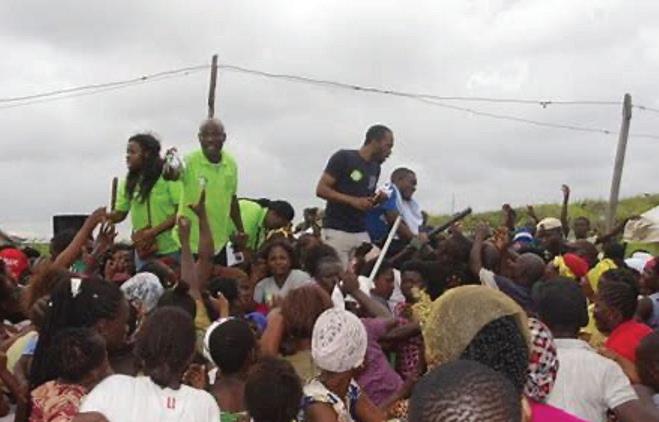
4 minute read
Haney Fellowship: Feeding the Most Vulnerable Nigerians
Feeding the most vulnerable Nigerians
The Haney Fellowship was established in 1998 by William “Bill” Haney, III ‘80, in honor of his father, the late William Haney, Jr., who lived and worked at Portsmouth Abbey School from 1968 to 1991 as a chemistry teacher, houseparent and golf coach. This creative and generous fund was established to provide Fifth Form students with a unique educational experience during the summer before their Sixth-Form year.
Students submit proposals that include a statement of purpose, a description of the program that the applicant wishes to pursue, and a documented estimate of costs. Students focus their plans on a course of study or travel/work experience that significantly furthers an existing academic interest or allows for the pursuit of a specialized opportunity. Udenna Nwuneli ’21 applied for a Haney Fellowship early in his Fifth-Form year, before the world was set on edge by the global pandemic. His original plan to cover the Olympic Games in Japan was scrapped when the games were postponed, so Udenna, intent on spending his summer engaged in a worthwhile endeavor, resubmitted a proposal to work with the Lagos Food Bank, an organization where he has volunteered since he was 13 years old. The following, written by Udenna for Business Day, a daily newspaper based in Lagos, is his account of his work with the Food Bank.
According to the United Nations, Nigeria has a poverty rate of 42.6%. Furthermore, the country ranks 93 out of 117 in the Global Hunger Index. The percentage of the population covered by Social Protection support is only 5.2%. This means that many families struggle to make ends meet, and the most vulnerable are faced with food insecurity and malnutrition, leading to many premature deaths of children and the elderly. These realities have persisted for many years, but have been further worsened by the economic and health shocks and food shortages related to the COVID-19 pandemic. This is where non-profi t organizations like Lagos Food Bank come in. It was founded in 2015 by Mr. Michael A. Sunbola, motivated by his own childhood experiences. As the third child in a family of fi ve children, his parents did not have a steady means of income. According to Michael, “most times, I ate one meal per day, going to school on an empty stomach, and went to bed regularly without food. We started fending for ourselves at a tender age selling nylon bags at a nearby market to get food. If we failed to make sales, we would stroll into a nearby farm to pick fruits that fell from the tree.” Even during holidays like Christmas, food was not readily available, and Michael and his siblings were compelled to depend on their neighbors. These experiences motivated Michael to devote his life to helping vulnerable people faced with food insecurity, especially mothers and children.
Michael at an outreach event pre-COVID-19
Operating in a megacity with millions of food-insecure people is not an easy feat; as a result, Lagos Food Bank has carved out its niche. First, the nonprofi t organization attracts volunteers, individual and corporate part
ners to support its vision. Then the team identifi es and selects an underserved area that is in dire need of food and contributions, prioritizing children from the ages of 5-16, vulnerable teenagers, widows and indigent adults over the age of 50 in these communities.
Churches, police stations, and hospitals also lend a hand by providing Lagos Food Bank with useful insights into which districts need the donations the most. The organization provides both perishable and non-perishable Volunteers carrying donated items for distribution during the COVID-19 pandemic. food products like rice, garri, beans, noodles, beverages, spices, vegetable oil, and baby food. They also offer nonfood items like toothpaste, soap and toilet paper, and other essential products that we take for granted. This is all made possible because of the generous and consistent donations made by individuals and organizations. Since its founding in 2015, Lagos Food Bank has reached 86 communities, has 7,000 registered volunteers, and has impacted over a million benefi ciaries. During the COVID-19 pandemic, the organization has experienced an outpouring of support from individuals and corporate funders and donors as well as volunteers, to feed more vulnerable people. It has also increased its

outreach activities, changing its approach signifi cantly to ensure social distancing, mask distribution, and other health precautions.
As someone who has volunteered with Lagos Food Bank on several occasions since I was thirteen, I have observed the organization’s commitment to transforming lives, and the unique benefi ts of volunteering to serve the most vulnerable.
While we all need to continue to support the Lagos Food Bank and other credible nonprofi t organizations focused on feeding Nigerians, we ultimately must ensure that we work together to ensure that we reduce poverty in our country. This long-term intervention will ensure that more households have access to nutritious food, and
more children do not go to bed hungry.

– Udenna Nwuneli ’21 reprinted from Business Day, July 17, 2020










